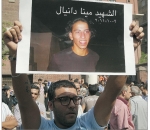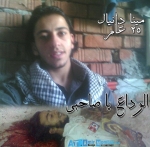19 October 2011
Killings of Christians bring chill to Arab Spring
His beard and long hair styled in imitation of his hero, Mina Daniels was that rare thing among Che Guevara look-alikes - a would-be revolutionary who actually found a revolution to fight.
As a regular face in the antigovernment protests that toppled former president Hosni Mubarak in February, the 20-year-old student from Egypt's Coptic Christian minority was the stuff of Facebook folklore: first for his cheerful songs promoting Muslim-Christian unity, second for the bullets he took during standoffs with the security forces - two plastic ones to the head and stomach, and a live one that scarred his leg.
Now, though, the young man whose friends nicknamed him "Guevara" is emblazoned on T-shirts himself, a belated "martyr" to the cause fellow protesters hoped had been won beyond doubt eight months ago. In an episode Oct. 9 reminiscent of the bloodiest days of the anti-Mubarak struggle, he was among a small crowd of Coptic demonstrators who were attacked in Cairo as they protested the destruction of a church by Islamic radicals in southern Egypt.
Some 25 people died, a number run over by armoured vehicles driven by soldiers supposedly policing the event, others clashing with gangs of Muslim extremist thugs. Daniel's luck against the bullets finally ran out, a shot from an unknown sniper wounding him fatally in the chest.
"Mina was a very kind, righteous person, and he dreamed of Egypt becoming like Europe, where the young people don't have to travel abroad to live their dreams," said his sister Mary, 41, who wore a black T-shirt with her brother's face on it as she spoke to the Sunday Telegraph at the family's home in a poor Cairo suburb on Friday.
"The demonstration was peaceful, but then we were suddenly attacked. First there were stones thrown, then armoured cars trying to run people over. As we ran away, thugs came at us with knives, shouting, 'You Copts, you infidels, this is an Islamic country.'"
That Christians should claim mistreatment by Muslims is nothing new in Egypt: the Coptic minority, who form roughly 10 per cent of Egypt's 80 million people, have long complained of discrimination in both jobs and politics. Of far more concern, however, was the sense that the army was involved in the bloodshed.
Lauded for refusing to fire on crowds during the original uprising, military chiefs were hailed as champions of the people when they took over as Egypt's caretaker rulers seven months ago. But now, both Christians and Muslims claim the chiefs are proving all too similar to the Mubarak regime
- intolerant of protest and reluctant to fulfil their pledges to hand over to an elected civilian government.
"The military government is no longer the people's friend," said Daniel, sitting in Mina's spartan bedroom, where a picture of Jesus and Mary looked down on a tattered Nelson Mandela biography. "Now they are creating civil war between Copts and Muslims, as an excuse to stay in power."
The army insists it acted with "restraint," but, for many, even the most generous explanation is that troops inexperienced in public order techniques simply panicked. Whatever the truth, disillusionment with the military government has set in, to the point where its head, Field Marshal Mohamed Tantawi, is the new "Mubarak" among the graffiti in Cairo's Tahrir Square.
He is also under fire over progress toward elections, the one thing that might allow Egyptians to express their differences peacefully. The first polls for a lower parliamentary house are due next month, but constitutional wrangling means elections for the key position of president may not take place for another year. Ten days ago, a coalition of presidential hopefuls demanded that the presidential polls be brought forward.
Yet even if that is granted, there is no guarantee that elections will prove a panacea. A multiparty contest will give a voice not only to Christians and liberals, but also to creeds of Islamists far more hard line than the Muslim Brotherhood, the dominant Islamic party already tipped to gain 20 per cent of the parliamentary vote.
Recent months have seen the rise of parties of the Salafists, whose long beards and nostalgia for the pious lifestyle of the Prophet's original followers make them a Muslim answer to America's Amish.
Copts blame the Salafists for attacks on churches and the zeal of some of their groups, such as Jamaat Islamiya, even unnerves many fellow Muslims. It was involved in the 1981 assassination of Mubarak's predecessor, Anwar Sadat, over his peace deal with Israel. To the disapproval of Sadat's family, the group, which refuses to apologize for the killing, plans to field hundreds of candidates in the parliamentary elections and contest the presidential poll as well.
True, in seeking a mandate from voters as well as God, even the Salafists have modernized a little. The president of the Reform and Renaissance party, Hesham Mustapha Abdelaziz, who holds degrees in both science and Shariah, rejects the term "Salafi" as a "misleading stereotype."
"We want a new social contract with all political powers, be they socialists, liberals or Islamists, and Copts should have equal rights too," he said.
"Yes, we support women wearing the hijab [the Islamic head scarf], but we're not going to force anyone. Socially, we are Islamists, but we are also a liberal democrat party."
Yet a Salafist liberal democrat is not a European liberal democrat, points out Ali Abdelwahab, a British-educated hospital doctor and secular Muslim, who views the rise of Islamist parties with concern.
"They talk nicely, but that's the thin end of the wedge," he said, drinking a late-night Scotch in a Cairo bar.
"Scratch a Muslim Brotherhood member and beneath the surface you'll find plenty of sympathy for how things work in Saudi Arabia."
Wary of being seen to flex its political muscles too much, the Brotherhood says it will not field a candidate in the presidential election. That hands a strong chance to Amr Moussa, the former foreign minister, who is runaway favourite. He is widely seen as a safe pair of hands, although he also fears Egypt risks going off the rails.
While he has refused to blame any particular side over the recent Copt deaths, he sees "angry Egyptians all over the place."
"If it was just one group it would be fine, but it is whole political scene," he said. "Confrontations allow thugs to thrive, and leave everybody talking about Christians versus Muslims."
Then again, a Moussa presidency would scarcely be a healing process either, especially for the Facebook generation, which wants no Mubarak-era figures returning. Much as he jokes about their distrust of him - "The era of Egyptian presidents getting 99 per cent approval rates is over," he said - Moussa could face protests in Tahrir Square himself if elected.
In the meantime, the shadow of Oct. 9's sectarian trouble may well lengthen - not least in the narrow alleyways around the Daniels' neighbourhood, a mixed Copt-Muslim area, where some Muslim neighbours feel Daniel's legacy will be that of troublemaker, not martyr. Watching as mourners visited his apartment block, one man muttered in a quiet but hostile tone: "What a mess we're in."
Read more: http://www.vancouversun.com/news/Killings+Christians+brin...
00:56 Posted in Egypt | Permalink | Comments (0) | ![]() Facebook |
Facebook |





















The comments are closed.